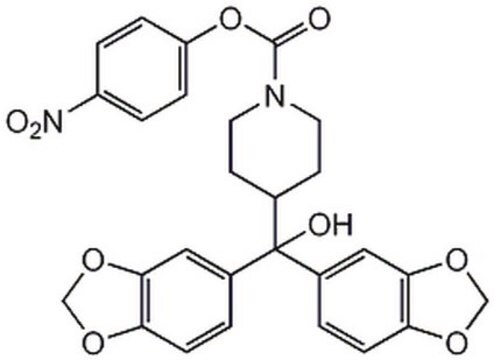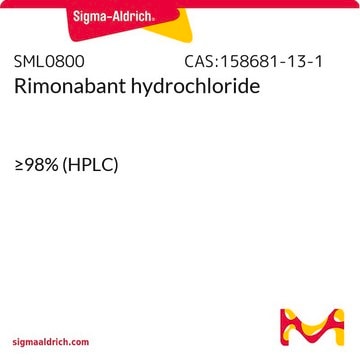Wichtige Dokumente
J3455
JZL 184 hydrate
≥97% (HPLC)
Synonym(e):
JZL184 hydrate
Größe auswählen
About This Item
Empfohlene Produkte
Assay
≥97% (HPLC)
Form
powder
Farbe
light yellow to yellow-green
Löslichkeit
DMSO: >20 mg/mL
Lagertemp.
2-8°C
SMILES String
O.OC(C1CCN(CC1)C(=O)Oc2ccc(cc2)[N+]([O-])=O)(c3ccc4OCOc4c3)c5ccc6OCOc6c5
InChI
1S/C27H24N2O9.H2O/c30-26(38-21-5-3-20(4-6-21)29(32)33)28-11-9-17(10-12-28)27(31,18-1-7-22-24(13-18)36-15-34-22)19-2-8-23-25(14-19)37-16-35-23;/h1-8,13-14,17,31H,9-12,15-16H2;1H2
InChIKey
HNSBVGMOKGQJLT-UHFFFAOYSA-N
Anwendung
Biochem./physiol. Wirkung
Leistungsmerkmale und Vorteile
Signalwort
Danger
H-Sätze
Gefahreneinstufungen
Acute Tox. 3 Oral
Lagerklassenschlüssel
6.1C - Combustible acute toxic Cat.3 / toxic compounds or compounds which causing chronic effects
WGK
WGK 3
Flammpunkt (°F)
Not applicable
Flammpunkt (°C)
Not applicable
Hier finden Sie alle aktuellen Versionen:
Analysenzertifikate (COA)
Die passende Version wird nicht angezeigt?
Wenn Sie eine bestimmte Version benötigen, können Sie anhand der Lot- oder Chargennummer nach einem spezifischen Zertifikat suchen.
Besitzen Sie dieses Produkt bereits?
In der Dokumentenbibliothek finden Sie die Dokumentation zu den Produkten, die Sie kürzlich erworben haben.
Kunden haben sich ebenfalls angesehen
Artikel
We offer many products related to cannabinoid receptors for your research needs.
Fatty acid synthesis supports cancer cell proliferation, essential for membrane generation, protein modification, and bioenergetics.
Active Filters
Unser Team von Wissenschaftlern verfügt über Erfahrung in allen Forschungsbereichen einschließlich Life Science, Materialwissenschaften, chemischer Synthese, Chromatographie, Analytik und vielen mehr..
Setzen Sie sich mit dem technischen Dienst in Verbindung.










